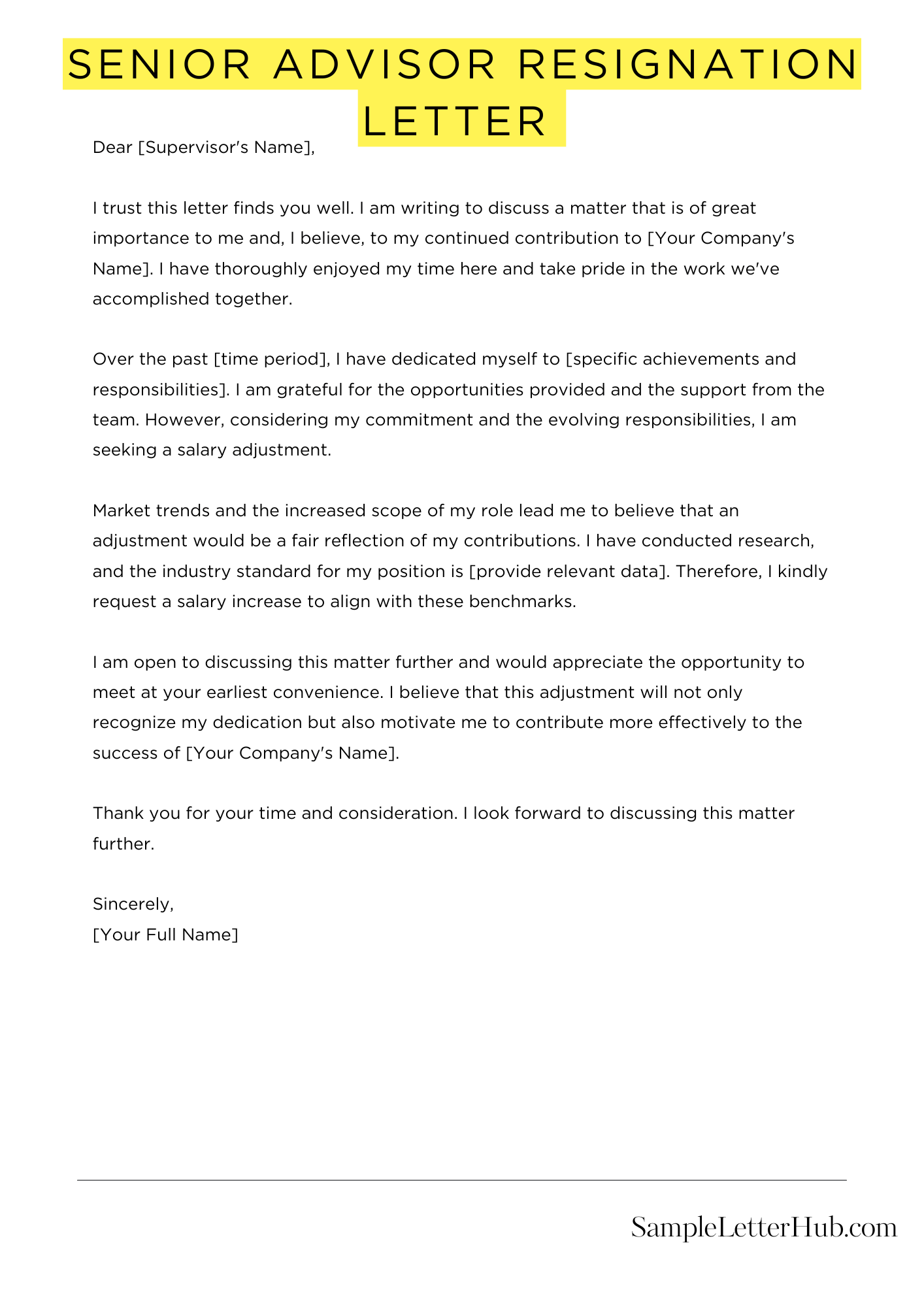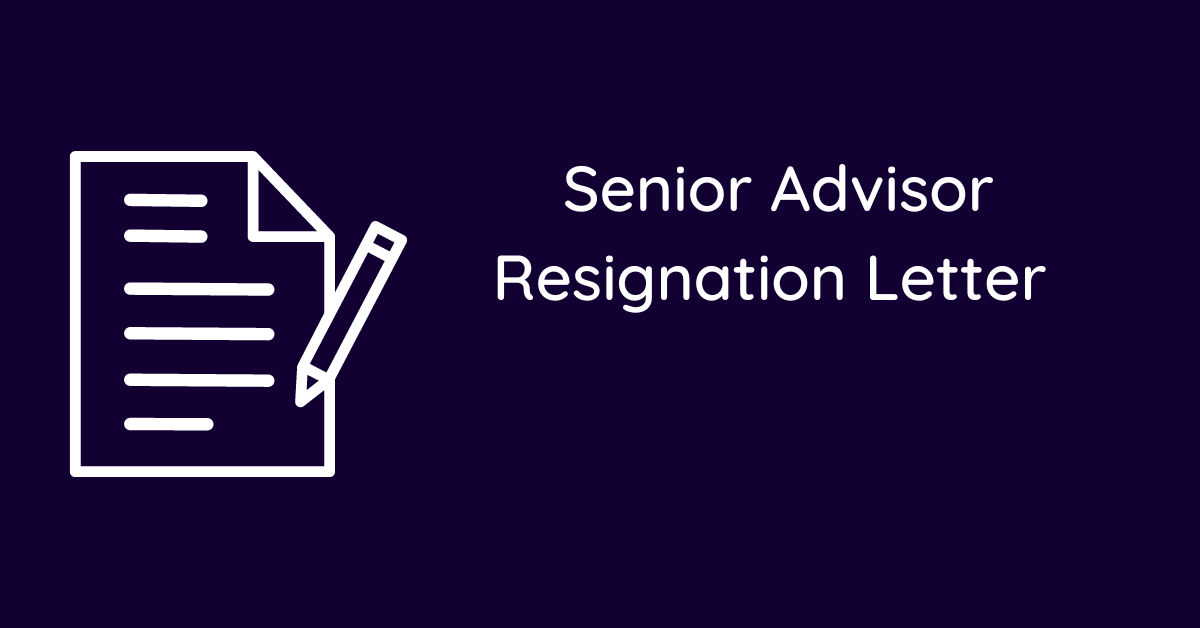When it comes to leaving a job, one way to do it is to write a clear and professional resignation letter explaining your decision to leave. If you’re a senior advisor, you’ll want to make sure your letter is well-written and polite.
In this article, we’ll share an example of a senior advisor resignation letter with you. We’ll also provide some tips on how to write a resignation letter that will leave a positive impression on your employer.
Remember to be polite and humble in your letter’s tone. Thank your employer for the opportunity to work at the company and express your appreciation for their support. You can also mention any positive experiences or accomplishments you had during your time there.
Senior Advisor Resignation Letter
Dear [Recipient Name],
Please accept this letter as formal notification that I will be resigning from my position as Senior Advisor with [Company/Organization Name], effective [Last Date of Employment].
This decision has not been made lightly. I have thoroughly enjoyed my time at [Company/Organization Name] and am grateful for the opportunities and experiences I have gained. I have learned a great deal and have made many valuable connections.
I want to express my sincere gratitude for your support and guidance during my tenure. I wish you and [Company/Organization Name] all the best in the future.
I will do everything I can to ensure a smooth transition during my departure. Please let me know if there is anything specific I can do to assist.
Thank you again for the opportunity to work with such a talented and dedicated team.
Sincerely,
[Your Signature]
Short Senior Advisor Resignation Letter Sample
Please accept this letter as formal notification that I am resigning from my position as Senior Advisor at [Company Name]. My last day of employment will be [Your Last Day]. Thank you for the opportunity to grow and learn during my time here. I wish you and the company continued success. I am happy to assist in the transition process to ensure a smooth handover of my responsibilities.
I wish you all the best with your senior advisor resignation letter.
When it’s time to say farewell, expressing your gratitude and best wishes can make the transition smoother:

How to Write a Senior Advisor Resignation Letter
1. Express Gratitude and Appreciation
Begin by expressing your sincere gratitude for the opportunity to serve as a Senior Advisor. Acknowledge the valuable experiences and insights you’ve gained during your tenure.
2. State Your Reason for Resignation
Clearly state your reason for resigning, whether it’s a new career opportunity, personal commitments, or a desire for a different challenge. Be concise and professional, avoiding any negative or accusatory language.
3. Offer a Smooth Transition
Offer to assist in ensuring a smooth transition during your departure. Express your willingness to train your successor or provide any necessary support. This demonstrates your commitment to the organization’s well-being.
4. Reiterate Your Support
Reassure the organization that you remain supportive of its mission and goals. Express your confidence in the team’s ability to continue achieving success.
5. End with a Positive Note
End your letter on a positive note, expressing your appreciation for the opportunity to contribute to the organization. Wish the team well in their future endeavors.
Senior Advisor Resignation Letter: 6 FAQs Answered
Resigning from a senior advisory position can be a daunting task. To help you navigate the process, here are answers to six frequently asked questions:
1. What should I include in my resignation letter?
Your resignation letter should include your name, position, the date you’re resigning, and your last day of employment. It should also express your gratitude for the opportunity to work at the company and wish the team well in the future.
2. How much notice should I give?
The standard notice period for a senior advisor is two weeks. However, it’s always best to check your employment contract to see if there are any specific requirements.
3. Do I need to provide a reason for my resignation?
It’s not necessary to provide a reason for your resignation, but it’s common to do so. If you do provide a reason, be brief and professional.
4. What should I do if I’m asked to stay on?
If you’re asked to stay on, it’s important to weigh the pros and cons carefully. Consider your reasons for resigning and whether or not you’re willing to compromise.
5. What if I’m not sure what to do?
If you’re not sure what to do, it’s always a good idea to consult with a career counselor or mentor. They can help you assess your options and make the best decision for your career.
6. How can I make my resignation letter stand out?
There are a few things you can do to make your resignation letter stand out. First, keep it brief and to the point. Second, use formal language and avoid using slang or colloquialisms. Third, proofread your letter carefully before submitting it.
Before making the decision to resign from your job, it’s essential to consider the legal aspects:
Understanding your emotions after quitting your job is important. Explore why you might be feeling sad:
Related
- Resignation letter sample
- Forced resignation letter
- Resignation letter due to going abroad
- Resignation letter due to marriage
- Resignation letter due to other opportunity
- Resignation letter due to mistake

